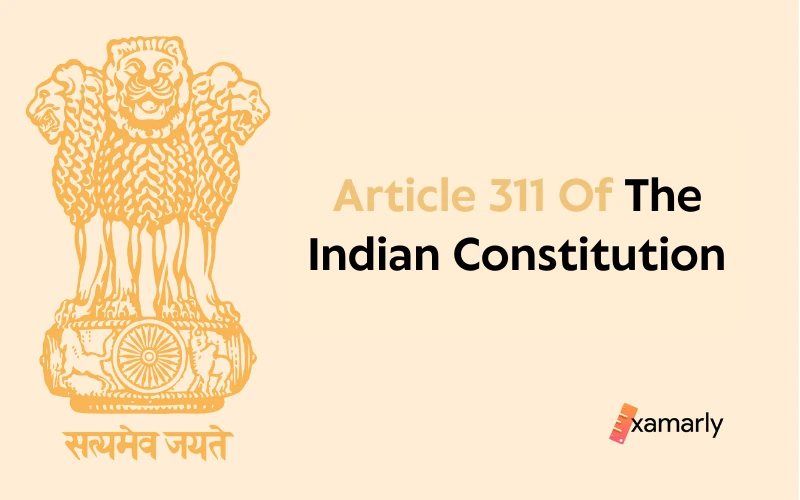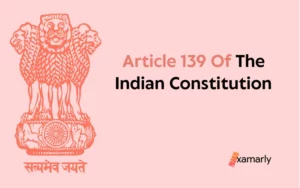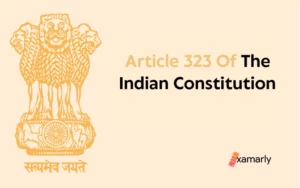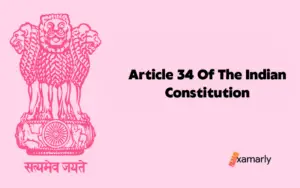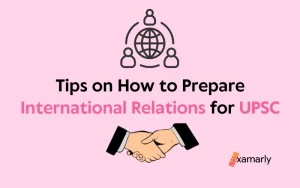Many students ask, What is Article 311 of the Indian constitution? Among its many provisions, it deals with civil employment.
Article 311 of the Indian Constitution enshrines a civil servant’s right to be heard. It provides protection against dismissal at pleasure and acts as a Constitutional guarantee. However, Article 311 does not apply to those who have committed a crime. In such cases, the civil servant will not be protected from dismissal and will be removed without a hearing.
The Doctrine of Pleasure does not apply to all government servants, but it certainly applies to public service.
It is a part of the Indian Polity syllabus in exams of Union Civil Services. Here are some examples. Let us say a police officer, a civil servant, or any officer from defense services has been convicted of a crime. He is subsequently pulled out from his post. He may not be allowed to defend himself, but his suspension from service without any inquiry is valid.
- What is Article 311 of the Indian Constitution and its Clause?
- Explanation of the Terms Used in Article 311
- Objective
- People Protected under Article 311
- Options to Dismissed Employee
- Process of Departmental Enquiry
- Significance of Article 311
- What is the Doctrine of Pleasure in India?
- The Opportunity of Being Heard
- Other Related Constitutional Provisions
- Relevant Cases
- Sukhbans Singh v. State of Punjab (1962)
- Shyam Lal v. State of Uttar Pradesh (1953)
- State of Bihar v. Abdul Majid (1954)
- State of Uttar Pradesh and Anr. v. Audh Narain Singh and Anr. (1964)
- Conclusion
- FAQs
- What is Clause 2 of Article 311?
- What is the Doctrine of Pleasure in India?
- Which article of the Indian Constitution makes reference to the doctrine of pleasure?
- In which article of the Indian Constitution is the term "All India Service" defined?
- Which categories of officers do not fall under the jurisdiction of Article 311?
- What occurs during a departmental investigation?
- In case civil servant believes that they have been subjected to unfair treatment during the departmental inquiry proceedings, where can they file a lawsuit to seek redressal?
- Which national authority is given power by the doctrine of pleasure?
- Can a government employee's dismissal from their position or their compulsory retirement fall inside the ambit of Article 311?
- State the Case Related to the Use of Article 311(2) Subsections.
- Write the exceptions to Article 311 (2).
What is Article 311 of the Indian Constitution and its Clause?
Article 311 of the Constitution of India deals with the regulations pertaining to the dismissal, withdrawal, or rank reduction of a civil servant serving under the Union of India or a State government
Clause 1
Anybody in the Union’s civil service, an all-India service, the civil service of a State, or civil service under the Union or a State will not be dismissed or withdrawn by any authority subordinate to the one who hired them.
Clause 2
No individual mentioned earlier shall be subject to dismissal, removal, or reduction in rank unless there has been an inquiry in which they were informed of the charges against them and provided a fair chance to respond to those charges.
If, after such an inquiry, it is proposed to impose a penalty on the individual, then the penalty may be imposed based on the evidence presented during the inquiry, without the need to provide the person with an opportunity to make representations regarding the proposed penalty:
With the additional proviso that this clause will not be applicable—
- (a) where a person is removed, dismissed, or reduced in rank as a result of a criminal act that was brought against them based on their actions.
- (b) if the authority who has the power to dismiss, remove or reduce a person in rank believes and documented in writing, that it is not feasible to conduct an inquiry for a valid reason.
- (c) in cases where the President or Governor is convinced that holding an inquiry would jeopardize the security of the State.
Clause 3
If there is uncertainty about the feasibility of conducting the inquiry mentioned in clause (2) for an individual in the aforementioned positions, the final decision on this matter will rest with the authority empowered to dismiss, remove, or reduce that person in rank.
Explanation of the Terms Used in Article 311
Dismissal and Removal
Although the terms “dismissal” and “removal” are synonymous, they have legal definitions due to their frequent occurrence in service rules. A person is prohibited from work in the future if they are dismissed, but they are not prohibited in the future if they are removed.
No Removal by Subordinate Authority
The phrase “no removal by subordinate authority” does not imply that the dismissal or removal must be carried out by the same authority who made the appointment or by his immediate supervisors.
It is sufficient if the authority that is dismissing someone from their position is of the same rank or a co-ordinate rank as the authority that appointed them.
Reduction in Rank
The term “reduction in rank” refers to a demotion from a higher position or post to a lower one, as opposed to losing one’s place within a rank or cadre. In the case of the State of Punjab v Kishan Das, the Supreme Court clarified that a decrease in salary within the same cadre does not qualify as a reduction in rank.
Informed of the charges
When we say that someone has been “informed of the charges,” we mean that they have been served with a charge sheet that details the reasoning behind the accusations that have been levied against the concerned officer as well as a statement of allegations against each charge.
Objective
The purpose of Article 311 of the Indian Constitution is to safeguard job security and protect the rights of individuals serving in civil service positions.
This article lays down the guidelines and procedures for dismissing or removing government officials from their positions and sets out certain exceptions to ensure that disciplinary action is taken fairly and justly.
The aim of this provision is to prevent arbitrary action against government officials and provide them with a reasonable opportunity to defend themselves against any accusations made against them.
Ultimately, Article 311 seeks to ensure that the dismissal or removal of government officials is done in a manner that is just, fair, and in accordance with the principles of natural justice.
Article 311 achieves this objective by virtue of the following mechanism:
- It provides security to government employees for the duration of their employment.
- It protects honest civil officials against the kind of corruption that could lead to their being arbitrarily demoted, removed, or fired.
- Any individual employed as a civil servant, regardless of their nature (permanent, temporary, officiating, or probationary), is protected under Article 311.
- Article 311 of the Indian Constitution provides specific guidelines for the removal or dismissal of civil servants in India, and any violation of these provisions is enforceable in a court of law. This indicates that civil servant has the right to seek legal remedy if their removal, dismissal, or demotion violates the guidelines set forth in this article. If it is found that their removal, dismissal, or demotion was in violation of the said Article, the civil servant is deemed to have never been removed, dismissed, or demoted.
- An offended civil servant has the option of seeking remedy before a state administrative tribunal or the Central Administrative Tribunal (CAT), respectively.
- In accordance with Article 311 of the Constitution of India, the dismissal of civil servants from their position might be construed as a form of punishment if the individual in question was eligible to hold the position. If a civil servant was terminated from his office and he had the right to hold the position during his appointment, the termination will automatically be deemed a punishment under the said Article. Nonetheless, if a civil servant held office without authorization, either terminating that employee’s employment or demoting him/her will not be regarded as punishment under Article 311.
- If a civil servant who is serving in a temporary capacity is fired for any contravention or because they have been found guilty of misconduct, their termination will be considered a form of punishment in accordance with Article 311.
The Supreme Court of India discussed two factors to decide whether dismissing a civil worker from his position qualifies as punishment under Article 311 of the Indian Constitution in the case of Parshotam Lal Dhingra v. Union of India (1957). These tests were conducted to find out whether:
- The civil servant had the legal authority to serve in the capacity for which he had been assigned, whether it be in the office or in the rank.
- A civil officer who acted in such a way has been met with unfavorable results.
People Protected under Article 311
The members of:
- All India Service such as Indian Administrative Service, Indian Revenue Service, Indian Police Service, etc.
- Civil service/Public officers of any State,
- Union Civil service,
- People who hold a civil office under any state or the Union
- Only civil servants, i.e. public officers, are covered by Article 331’s protective protections. These protective safeguards are unavailable to the service of people appointed to defense personnel.
Options to Dismissed Employee
A government employee who is fired under these laws may seek justice through tribunals such as the state administrative tribunal, the Central Administrative Tribunal (CAT), the courts, or through competent authority.
Note: To know more about the other article of the Indian Constitution, click on the corresponding link of the linked text from the table given below:
| Article 131 of the Indian Constitution |
| Article 12 of the Indian Constitution |
| Article 356 of the Indian Constitution |
| Article 370 Advantages And Disadvantages |
Process of Departmental Enquiry
The Departmental Enquiry Process is as follows:
- Following the appointment of an enquiry officer in a departmental investigation. A formal charge sheet is issued to the civil servant. A civil servant has the option of representing himself or hiring a lawyer in the normal procedure.
- During the departmental investigation, witnesses may be called. After that, the investigation officer might write a report and present it to the government for further action under the article.
Significance of Article 311
The Indian constitution protects civil personnel from arbitrary dismissal. This provision, however, does not apply to defense personnel.
It imposes two limitations on the ‘doctrine of pleasure.’ To put it another way, it protects civil officials from arbitrary dismissal from their jobs in case of justifiable issues [Article 311 clauses (1) and (2)].
It is crucial to understand the arrangements of Article 311 of the constitution when it comes to civil employment.
The first important principle to remember is that arbitrary dismissal from service cannot be justified by a legitimate reason. In addition, a dismissed employee cannot be forced to return to his previous position unless he has resigned from the service.
- It helps investigators respond to alleged criminal investigations so that civil servants are not arbitrarily dismissed.
- In the three situations that follow, Article 311(2) [holding inquiry] is unavailable:
- When a person is let go, withdrawn, or demoted in rank on grounds of conduct that resulted in his criminal charge case; or
- Where the authority entitled to dismiss or withdraw a person or reduce his rank is convinced that it’s not rationally practical to undertake a departmental inquiry for a reason, to be noted in writing by that authority;
- Where the President or Governor, as is in most cases, is convinced that holding such a detailed inquiry isn’t in the best interests of the state’s security.
What is the Doctrine of Pleasure in India?
In Indian Constitution, the doctrine of pleasure is enshrined in clause 1 of Article 310.
- Members of a state’s civil service or those holding civil jobs under a state’s jurisdiction also serve at the leisure of the state governor.
- Individuals who are part of the Defence Services, Central Public Services, All India Services, and those occupying military or civilian roles under the Central government are subject to Article 310, which allows them to hold their positions at the discretion of the President.
- Notwithstanding the general principle of termination at the discretion, there exists an exception to this norm.
- To secure the services of an individual with special qualifications, the President or Governor has the authority to offer compensation in two circumstances:
- if the position is removed before the end of the agreement; or
- if he should vacate the position on his own accord, which was not related to misconduct.
- Notably, a contract such as this can only be negotiated with a newcomer, that is, someone who has never served in the military, an all-India service, the Central civil service, or a state civil service.
Exceptions
Although the President of India and the Governors of individual states wield authority through the doctrine of pleasure, there are specific situations where this principle’s application is limited.
The following individuals cannot be dismissed or removed from their position on the grounds of violating the doctrine of pleasure:
- It is not possible to remove or dismiss Supreme Court judges before the end of their terms in office (Article 124).
- High court judges are protected against being removed from office or replaced before the end of their terms (Article 218).
- The position of chief election commissioner is outside the jurisdiction of the doctrine of pleasure (Article 324).
- The Public Service Commission’s chairman and members are exempt from Articles 310 and 311 of the Constitution of India. (Article 317).
The Opportunity of Being Heard
The right to be heard has a broad application to Indian civil servants in the government.
- Originally, a civil servant was given the opportunity to be heard at two distinct junctures. These two phases were the inquiry stage and the punishment stage.
- The 42nd Amendment Act of 1976, however, withdrew the option for a second stage opportunity (which means, for example, a civil servant’s right to submit objections against the punishments proposed in the investigation.)
- The Supreme Court held that a civil servant’s reasonable opportunity of being heard (as defined in the second safeguard stated above) includes:
- a. an opportunity to decline his guilt and prove his innocence, which is allowed only if he knows what accusations have been brought against him and what allegations have been made against him.
- b. an opportunity to defend himself by cross-examining witnesses called against him as well as questioning himself or other supporting witnesses of his case; and
- c. Before considering the report, the disciplinary authority shall provide an inquiry officer report copy to the delinquent public servant for comments and observations.
Other Related Constitutional Provisions
- The Union’s executive power and the states flow down to the president or governor either directly or through other members subordinate to him.
- Part XIV of the Indian Constitution deals with Union and State Services.
- Article 309 of the Constitution of India confers upon the Parliament and state legislatures the power to regulate the appointment and conditions of service of persons appointed to public services and positions concerning the Union’s or any State’s matters, respectively.
- Unless otherwise provided by the Constitution, federal officials act at the discretion of the President under Article 310, and state officials act at the discretion of that particular state Governor. (English doctrine of Pleasure).
- However, the government’s power is not absolute.
- Government of India (Business Transactions) Rules: These Rules govern how officers are expected to assist the President or Governor in carrying out his or her executive tasks.
- Article 311 places limitations on the President’s or Governor’s absolute right to dismiss, remove or reduce an officer’s rank.
- Article 312 –Rajya Sabha has the right to set up new branches of IAS by two-thirds of its majority vote under this article.
Relevant Cases
The following are a few case references that are significant to civil servants, their rights, and constitutional requirements regarding the same:
Sukhbans Singh v. State of Punjab (1962)
In the case of Sukhbans Singh v. State of Punjab, the Supreme Court was tasked with answering whether the termination of a government servant’s employment constituted punishment under Article 311.
According to the judgment of the court, the act of suspending a civil servant does not come under the purview of Article 311, which governs the removal, dismissal, and reduction of the position of public servants.
Consequently, government employees who have been suspended are barred from seeking constitutional remedies in courts or tribunals as per clause 2 of the aforementioned article.
Shyam Lal v. State of Uttar Pradesh (1953)
Another case with a similar question of law is Shyam Lal v. State of Uttar Pradesh. In that case, the court ruled that a government employee’s mandatory retirement does not qualify as a dismissal, removal, or decrease in rank per Article 311.
As a result, the government servant is unable to have a cause of action under clause 2 of the said Article.
State of Bihar v. Abdul Majid (1954)
In the case of the State of Bihar v. Abdul Majid, the Supreme Court examined the rights of civil servants in India and made a significant ruling.
The court held that civil servants have the legal right to file a lawsuit against the government in order to obtain their overdue salaries and arrears. This ruling was considered to be a progressive step in the legal protection of civil servants’ rights, as it gave them the ability to seek legal recourse in cases where their salaries were not being paid.
State of Uttar Pradesh and Anr. v. Audh Narain Singh and Anr. (1964)
Facts
In the case of the State of Uttar Pradesh and Anr. v. Audh Narain Singh and Anr., the individual in question was appointed as a Tahsildar within the Cash Department of the Government Treasury located in the district of Azamgarh, Uttar Pradesh.
This appointment was made by the Treasurer, and it had been approved by the Collector of Azamgarh.
After being given the go-ahead by the Collector, he was subsequently removed from his duties. He complained about being expelled without having a fair chance to state his case in accordance with Article 311(2).
The legal issue at hand pertained to the determination of whether the respondent’s position falls within the purview of a civil servant or civil post as defined under Article 311(1).
Held
The Supreme Court came to the decision that the individual in question, who was appointed by the Treasurer with the consent of the Collector to the Cash Department of the State, held a civil position that qualified him as a government employee under Article 311(1).
The correct procedures for removing this person from office were not followed, rendering their dismissal null and void.
In the event of a dismissal, removal, decrease in rank, or disciplinary inquiry against allegations that have been leveled against them, the Tahsildars are subject to the inspection and power of the District Officers, and they receive their remuneration straight from the state.
As such, the individual in question is safeguarded by Article 311 and cannot be dismissed without adhering to the strict procedures outlined within that article.
Conclusion
In conclusion, Article 311 of the Indian Constitution is a crucial safeguard for civil servants, ensuring that they are not dismissed, demoted, or reduced in rank without being given a reasonable opportunity to defend themselves.
It strikes a balance between the need for efficiency and discipline in the civil service and the fundamental right of an individual to be heard and be given a fair chance. This provision is a testament to India’s commitment to upholding the principles of natural justice and due process, making it an integral part of the country’s legal framework.
FAQs
What is Clause 2 of Article 311?
Article 311(2) stipulates that an inquiry must be conducted before a civil servant can be dismissed, removed, or have their rank reduced. During the inquiry, the civil servant in question must be made aware of the charges against them and provided with a fair chance to present their case in response to those charges.
What is the Doctrine of Pleasure in India?
According to the doctrine of pleasure in India, those who are employed by the Defense Services, the Union Civil Service, or the All-India Services keep their positions at the President’s pleasure, whereas those who work for the State Services do so under the Governor’s pleasure.
Which article of the Indian Constitution makes reference to the doctrine of pleasure?
The doctrine of pleasure is a critical aspect of the Indian Constitution that regulates the tenure of civil servants in the country. Specifically, Article 310 of the Constitution addresses this doctrine, outlining that civil servants in India hold office at the pleasure of the President at the union level and the Governor of a particular state at the state level.
In which article of the Indian Constitution is the term “All India Service” defined?
The All India Services find a mention in Article 312.
Which categories of officers do not fall under the jurisdiction of Article 311?
Article 311 excludes members of the defense personnel from the scope of its provisions.
What occurs during a departmental investigation?
During a departmental investigation, the designated inquiry officer formulates a charge sheet outlining the allegations leveled against the civil servant and provides an opportunity for them to present a detailed explanation. The departmental inquiry proceedings are conducted in a fair and transparent manner, ensuring that such people are afforded ample opportunity to be heard. Once all evidence, witnesses, and relevant examinations have been presented, the inquiry officer prepares a final report, and the civil servant is allowed to provide additional remarks or observations before the report is submitted to the appropriate government authority for further action.
In case civil servant believes that they have been subjected to unfair treatment during the departmental inquiry proceedings, where can they file a lawsuit to seek redressal?
If civil servant believes that they have been treated unfairly, they have the option of appealing their case to either the Central Administrative Tribunal or one of the state administrative tribunals.
Which national authority is given power by the doctrine of pleasure?
At the central level, the President and in their respective states, the Governors hold the authority and liberty endowed by the doctrine of pleasure.
Can a government employee’s dismissal from their position or their compulsory retirement fall inside the ambit of Article 311?
No. In the circumstance where a government servant is suspended from service, it is not possible to invoke the requirements stated in Article 311 of the Indian Constitution. Moreover, compulsory retirement cannot be covered by the constitutional right outlined in Article 311.
State the Case Related to the Use of Article 311(2) Subsections.
A Special Task Force (STF) was established by the Jammu and Kashmir government to investigate cases of employees who may have engaged in behavior that calls for disciplinary action under Article 311(2)(c). The said Article was used as the basis for terminating the employment of three government workers, including two teachers.
Write the exceptions to Article 311 (2).
(a) In the event that a person is fired, removed, or demoted from their position due to behavior that resulted in the individual being convicted of a criminal offense; or
(b) When the authority with the capacity to fire, demote, or decrease a person’s rank is satisfied that it is not practically practical to conduct such an inquiry for a reason that will be recorded by that authority in writing; or
(c) In the event that either the President or the Governor, depending on the circumstances, is convinced that it would be detrimental to the safety of the state to carry out such an investigation, the inquiry will not be carried out.


